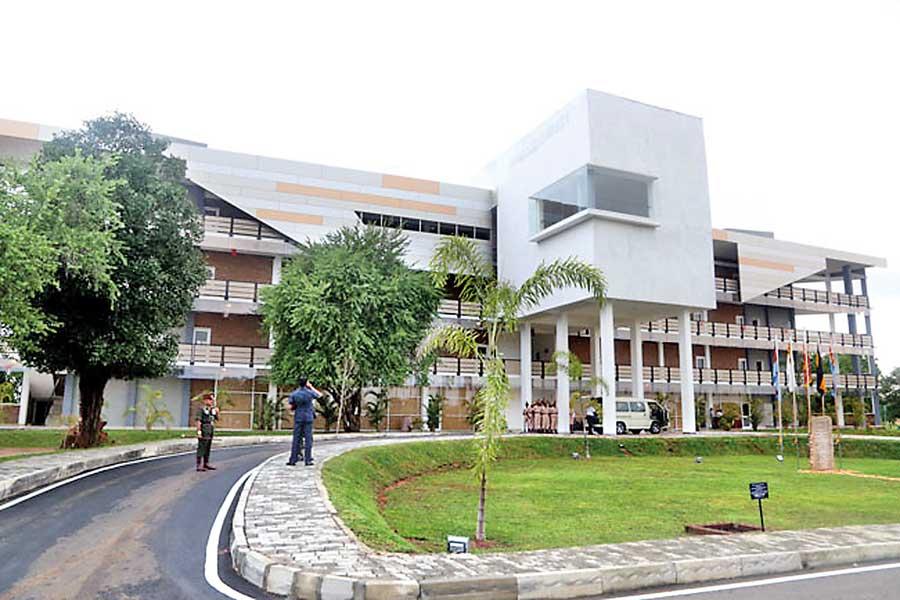Reply To:
Name - Reply Comment
Last Updated : 2024-04-25 00:00:00

There is a common myth promoted by the ruling classes backed by finance capitalists that privatisation and commercialisation of state institutions lead to greater efficiency and better services. However, international evidence points to privatisation as the moment when there is great extraction of public wealth by the elite, and when commercialised enterprises fail, governments bail them out. The General Sir John Kotelawala Defence University (KDU) is an example of such gross mismanagement of public funds.
commercialisation of state institutions lead to greater efficiency and better services. However, international evidence points to privatisation as the moment when there is great extraction of public wealth by the elite, and when commercialised enterprises fail, governments bail them out. The General Sir John Kotelawala Defence University (KDU) is an example of such gross mismanagement of public funds.
Let’s hear it from the horse’s mouth itself, as the KDU Annual Report for 2017 mentions the following from its Audit Report:
“The University had obtained a foreign currency loan of US$ 177.33 million equivalent to Rs 23,102,546,177 and a local currency loan of Rs 3,165,821,000 on April 29, 2013 from the National Savings Bank on a Treasury guarantee for the purpose of constructing the Defence University Teaching Hospital. The University was to pay the loan completely by the end of the year 2033 and starting from the year 2018, the University should pay it using the incomes it generates. However, it was observed that the repayment of the above-mentioned loan was problematic as there was a deficit in the financial outcome of the University from the year 2013 to the year under review.”
The 177 million dollar question is who is going to pay back this massive loan? With recent moves to form the Kotelawala National Defence University (KNDU) as a militarised commercial university creating a parallel system to the University Grants Commission (UGC), or alternatively to bring KDU under the UGC undermining the very ethos of the university system, raise worrying questions.
Drain on foreign reserves
 The Government’s argument for private universities claims that students going to universities abroad drain Sri Lanka of foreign exchange. But ironically, it is precisely the KDU hospital built with a US$ 177 million loan to attract such students that has been a great drain on Sri Lanka’s foreign reserves with little to show for the return on that investment. Time and again around the world, commercialising healthcare and education have proven to be failures. In fact, the often repeated scenario is that once such commercialised ventures fail, those enterprises are then privatised for a fraction of the cost of the initial investment allowing financiers close to the rulers to make a killing on the deal.
The Government’s argument for private universities claims that students going to universities abroad drain Sri Lanka of foreign exchange. But ironically, it is precisely the KDU hospital built with a US$ 177 million loan to attract such students that has been a great drain on Sri Lanka’s foreign reserves with little to show for the return on that investment. Time and again around the world, commercialising healthcare and education have proven to be failures. In fact, the often repeated scenario is that once such commercialised ventures fail, those enterprises are then privatised for a fraction of the cost of the initial investment allowing financiers close to the rulers to make a killing on the deal.
Let’s provide some perspective on the US$ 177 million investment and the Rs. 36 billion loan that has been guaranteed by the Treasury. The average amount spent over the last five years for fertiliser imports was US$ 196 million, and the fertiliser subsidy in 2020 amounted to Rs. 36 billion (Finance Ministry Annual Report 2020). As millions of farmers are shattered by the fertiliser import ban this year, and where even the country’s food security may suffer due to the huge drop in agricultural yields, do our farmers know about how the state manages public funds?
Rescuing KDU
Left to the devices of the so-called efficient market, KDU would be bankrupt by now. However, the Government is painting a rosy picture of KDU’s future, while bailing out KDU through annual allocations from the Budget. According to the Budget Estimates for 2021, this year and in future years possibly until 2033, there needs to be an allocation of Rs 5.5 billion for the loan and interest payments, even as the loan is being converted into Sri Lankan rupees.
"The 177 million dollar question is who is going to pay back this massive loan? With recent moves to form the KNDU as a militarised commercial university creating a parallel system to the UGC, or alternatively to bring KDU under the UGC undermining the very ethos of the university system, raise worrying questions"
Let’s again provide some perspective on this Rs 5.5 billion annual loan and interest payment. The ongoing tremendous protests of underpaid school teachers for higher wages may be a case in point. The budget allocation for the total salaries and allowances of the close to 8,000 primary school teachers in National Schools is Rs 5.4 billion; so in effect their income could have been doubled. Alternatively, for the total number of teachers and principals in Provincial Schools and National Schools totalling 260,000 an allocation of Rs 5.5 billion could have provided an allowance of Rs 21,000 each per year. Many times more is needed in salary increases for teachers, but in these pandemic hit times Rs. 21,000 is more than the relief given to people in the form Rs 5,000 cash grant by the Government.
I focus on school teachers, because I also want to remind my colleagues in universities that the really hard work of teaching and the foundation for our country comes from general education rather than university education. We can also take our universities, particularly the non-academic staff that are made invisible, yet form the majority of the existing universities cadres amounting to 13,307. In fact, their salary anomalies and grievances can be addressed many times over with Rs 5.5 billion.
Exploitation and protests
All institutions of work are sites of exploitation, and schools and universities are no different. The protests of teachers and non-academic staff are a reaction to such decades of exploitation. When education is commercialised such exploitation of the educational workforce will be intensified. Furthermore, commercialising education exploits students and their parents, indebting them for years if not decades. Therefore, KNDU is about the future of education that spells dangers of militarisation, commercialisation and ultimately intensified exploitation.
As the possibility of KNDU comes into the limelight there are many unanswered questions; particularly, why is the Government pushing it now amidst such a great crisis of state and society. The analysis above points to cover up of mismanaged public funds. The militarisation of society and commercialisation of education to reap profits might be other reasons. I would argue it is a combination of many such factors that are ultimately about democracy.
Seventy five years ago it was education for a democracy that was the vision of free education, and it is democratic struggle today that can save free education. The student movements, teachers unions, non-academic staff unions and the university teachers associations all have a great task ahead. The battle against KNDU has to be transformed into a struggle for freedom, equality and democratisation of our education system.

Add comment
Comments will be edited (grammar, spelling and slang) and authorized at the discretion of Daily Mirror online. The website also has the right not to publish selected comments.
Reply To:
Name - Reply Comment
US authorities are currently reviewing the manifest of every cargo aboard MV
On March 26, a couple arriving from Thailand was arrested with 88 live animal
According to villagers from Naula-Moragolla out of 105 families 80 can afford
Is the situation in Sri Lanka so grim that locals harbour hope that they coul